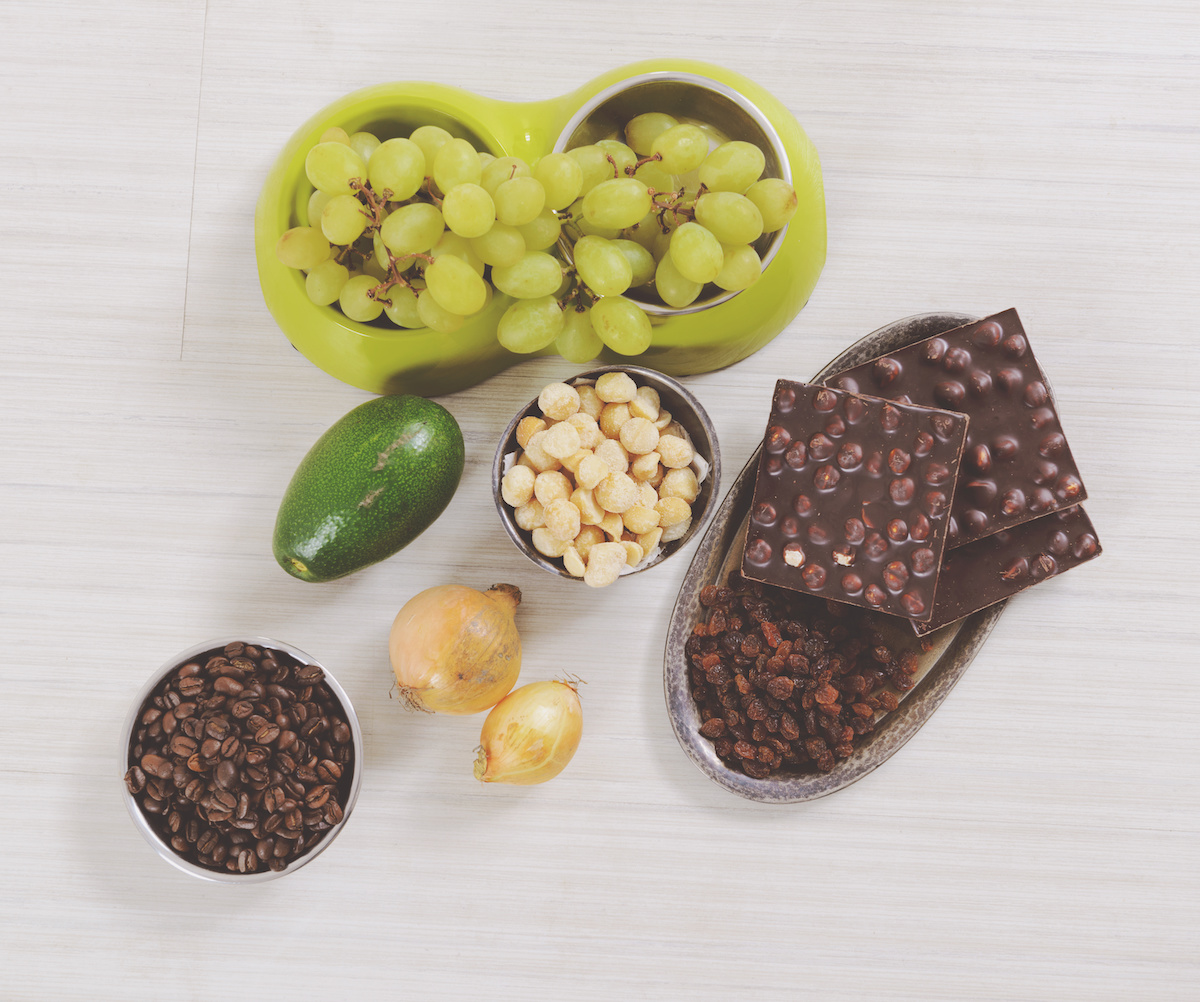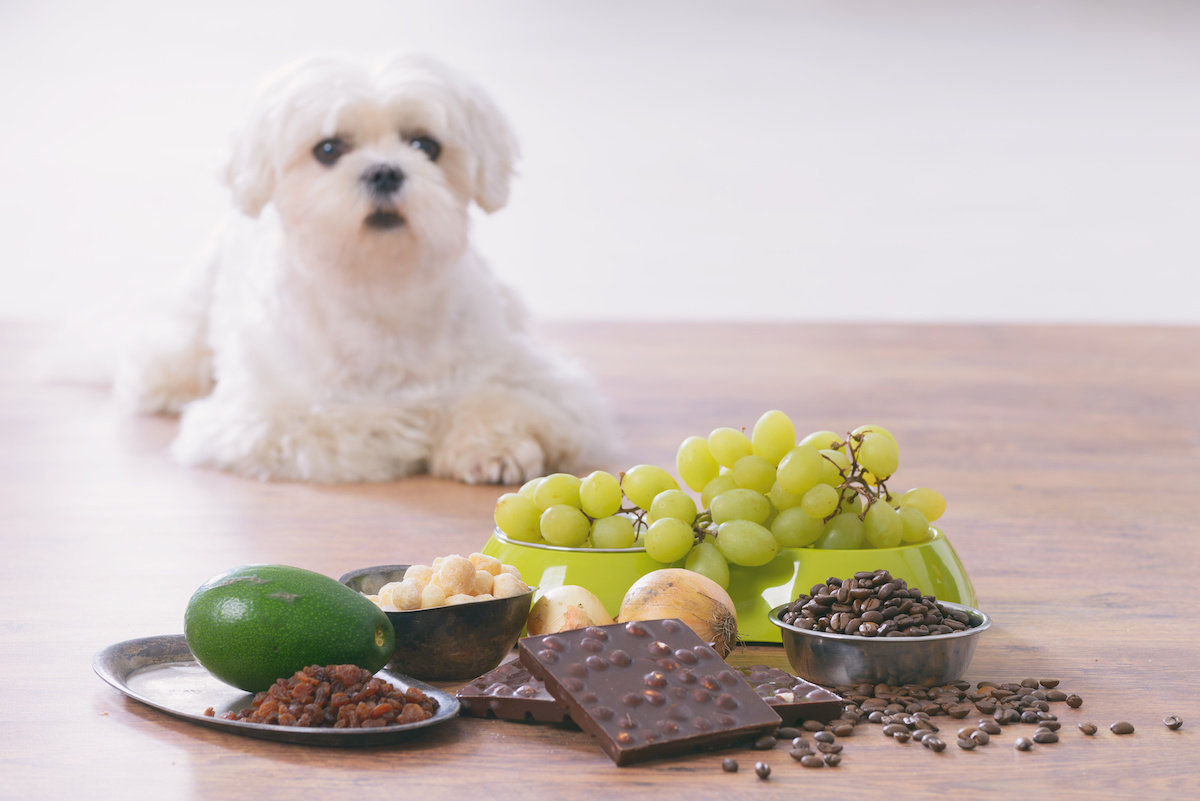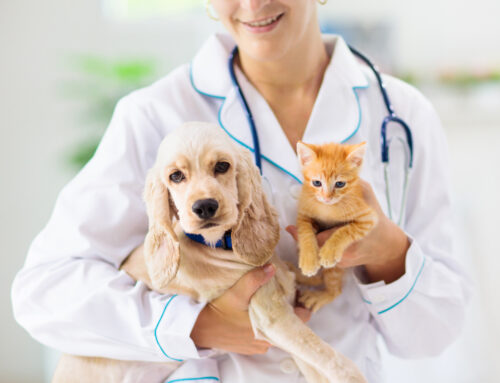As a veterinarian, it is crucial for pet owners to be aware of the foods that are poisonous to their furry friends. Consuming even a small amount of poisonous food for pets can cause serious illness or even death. Symptoms of poisoning can include vomiting, diarrhea, seizures, and difficulty breathing. By educating yourself on poisonous foods for pets and taking steps to keep these foods out of reach, you can help keep your beloved pets safe and healthy.
Toss the Chocolate
Chocolate contains a chemical called theobromine, which pets cannot metabolize as efficiently as humans. When ingested, even in small amounts, it can cause vomiting, diarrhea, seizures, and in severe cases, heart failure and death. If your pet eats chocolate, seek emergency veterinary care immediately. Time is of the essence. Prompt treatment can make all the difference in the outcome for your beloved pet.
What Happens if Your Pet Eats Chocolate?
Here are some potential health problems that can occur from feeding pets chocolate:
- Theobromine metabolizes more slowly in pets than in humans, which means it can build up to dangerous levels in their system.
- The amount and type of chocolate ingested can affect the severity of symptoms, with baking and bitter chocolate posing the greatest risk.
- The toxic effects of chocolate can take several hours to appear. This makes it important to seek veterinary care immediately if you suspect your pet eats chocolate.
If you suspect that your pet has ingested chocolate, don’t wait for symptoms to appear. Contact your veterinarian or an emergency animal hospital right away for prompt and potentially life-saving treatment.
Grapes and Raisins are a No-Go
The exact substance that causes toxicity from grapes and raisins in pets is unknown. But small amounts can cause kidney failure in dogs and cats. Symptoms can include vomiting, diarrhea, lethargy, and decreased appetite. It’s important that you seek medical treatment right away if your pet eats grapes or raisins.
What Happens if Your Pet Eats Grapes or Raisins?
Here are some potential health problems that can occur from feeding pets grapes or raisins:
- In severe cases, kidney failure can lead to dehydration, decreased urine production, and even death.
- The toxicity of grapes and raisins can vary depending on the size and weight of the pet, as well as how much they eat of it.
Omit Onions and Garlic from Your Pet’s Diet
If you are feeding your pet a burger at your cookout, hold the onion. Along with garlic, these foods contain compounds that can damage your pet’s red blood cells, leading to a condition known as Heinz body anemia. Symptoms may include vomiting, diarrhea, lethargy, and pale gums. It’s best to keep these foods out of the reach of your furry friends to avoid any potential harm.
What Happens if Your Pet Eats Onions or Garlic?
Here are some of the potential health problems that can arise: if your pet eats onion or garlic:
- Hemolytic anemia: Onion and garlic contain compounds called thiosulphates that can cause oxidative damage to red blood cells in pets. This can lead to hemolytic anemia, a condition where the body destroys its own red blood cells faster than it can produce new ones. Symptoms of hemolytic anemia in pets include lethargy, pale gums, rapid heartbeat, and difficulty breathing.
- Gastrointestinal upset: Both onions and garlic can cause gastrointestinal upset in pets. Symptoms include vomiting, diarrhea, abdominal pain, and loss of appetite. In severe cases, pets can become dehydrated and require hospitalization.
- Damage to organs: Prolonged exposure to onion or garlic can cause damage to a pet’s organs, particularly the kidneys. This can lead to chronic kidney disease, which can be life-threatening. Symptoms of kidney disease in pets include increased thirst and urination, weight loss, and lethargy.
- Allergic reactions: Some pets may be allergic to onions or garlic, leading to symptoms such as itching, swelling, and difficulty breathing. In severe cases, an allergic reaction can be life-threatening.
As a responsible pet owner, it is important to avoid feeding your pets onions or garlic. Please call us if you suspect ingestion of these foods.

The Dangers of Xylitol
Xylitol is a sugar substitute that is commonly found in many sugar-free products such as chewing gum, candies, and baked goods. Although xylitol is safe for human consumption, it can be extremely toxic to pets, particularly to dogs. Here are some reasons why:
- Rapid insulin release: When pets consume xylitol, it rapidly releases insulin in their bodies, causing a sudden drop in blood sugar levels. This can lead to hypoglycemia, a potentially life-threatening condition. Symptoms of hypoglycemia in pets include vomiting, loss of coordination, seizures, and coma.
- Liver damage: Xylitol can also cause severe liver damage in pets, particularly in dogs. Ingestion of xylitol can cause liver cell death, leading to liver failure. Symptoms of liver failure in pets include loss of appetite, vomiting, diarrhea, and yellowing of the skin and eyes.
- Delayed symptoms: The symptoms of xylitol poisoning in pets may not be immediate and can take up to 12-24 hours to manifest. This can make it difficult to identify the cause of illness and provide timely treatment.
Please seek immediate help if your pet ingests this type of sugar.
Always Avoid Avocado
Avocado contains a substance called persin, which can be toxic to some animals, particularly to birds, rabbits, horses, and ruminants. Many are unaware that this is a poisonous food for pets. While dogs and cats are generally less sensitive to persin, they can still experience gastrointestinal problems if they consume large amounts of avocado flesh, skin, or pit.
Meanwhile, the avocado pit can pose a choking hazard or intestinal obstruction risk for pets. Therefore, it’s best to avoid feeding your pets avocados altogether.
Potential Health Problems of Pets Consuming Avocado:
While avocado is safe for human consumption, it can be potentially harmful to some animals, including birds, rabbits, and horses. Here are some potential health problems that can arise:
- Gastrointestinal problems: Avocado contains a substance called persin, which can cause gastrointestinal problems in some pets. Symptoms of gastrointestinal problems include vomiting, diarrhea, abdominal pain, and loss of appetite.
- Pancreatitis: Avocado is high in fat, which can cause pancreatitis in some pets. Pancreatitis is a condition where the pancreas becomes inflamed and can lead to symptoms such as vomiting, diarrhea, and abdominal pain.
- Cardiac arrest: In rare cases, ingestion of avocado can cause cardiac arrest in some pets due to the presence of persin.
Need More Information on Poisonous Food for Pets? Contact Animal Care Center
Some common human foods can be toxic to pets, and it’s essential to prevent any accidental ingestion that could cause serious health problems. If you suspect your pet has ingested any potentially poisonous food, seek veterinary care immediately.
Contact Animal Care Center for guidance or seek emergency veterinarian services to ensure prompt treatment and prevent any potential health complications. Remember, being a responsible pet owner means keeping your furry friend safe and healthy at all times.






